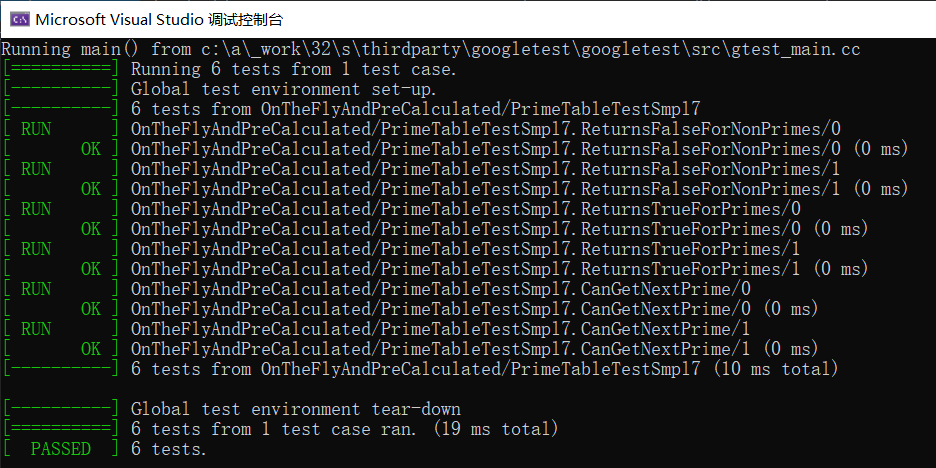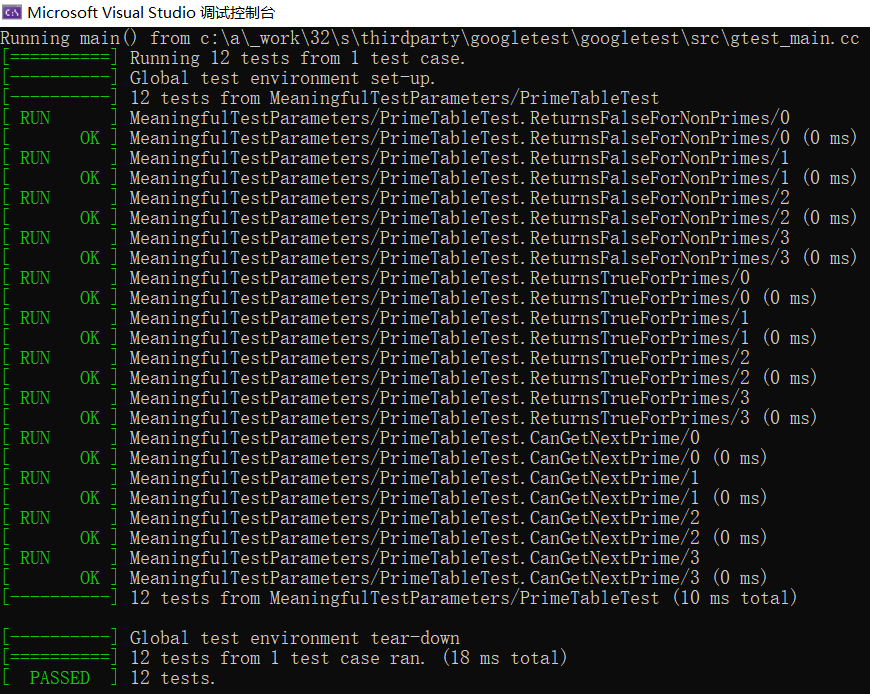1.7 sample7--接口测试
值参数不限定类型,也可以是类的引用,这就可以实现对类接口的测试,一个基类可以有多个继承类,那么可以测试不同的子类功能,但是只需要写一个测试用例,然后使用参数列表实现对每个子类的测试。
using ::testing::TestWithParam; using ::testing::Values; typedef PrimeTable* CreatePrimeTableFunc(); PrimeTable* CreateOnTheFlyPrimeTable() { return new OnTheFlyPrimeTable(); } template <size_t max_precalculated> PrimeTable* CreatePreCalculatedPrimeTable() { return new PreCalculatedPrimeTable(max_precalculated); } // Inside the test body, fixture constructor, SetUp(), and TearDown() you // can refer to the test parameter by GetParam(). In this case, the test // parameter is a factory function which we call in fixture's SetUp() to // create and store an instance of PrimeTable. class PrimeTableTestSmpl7 : public TestWithParam<CreatePrimeTableFunc*> { public: ~PrimeTableTestSmpl7() override { delete table_; } void SetUp() override { table_ = (*GetParam())(); } void TearDown() override { delete table_; table_ = nullptr; } protected: PrimeTable* table_; }; TEST_P(PrimeTableTestSmpl7, ReturnsFalseForNonPrimes) { EXPECT_FALSE(table_->IsPrime(-5)); EXPECT_FALSE(table_->IsPrime(0)); EXPECT_FALSE(table_->IsPrime(1)); EXPECT_FALSE(table_->IsPrime(4)); EXPECT_FALSE(table_->IsPrime(6)); EXPECT_FALSE(table_->IsPrime(100)); } TEST_P(PrimeTableTestSmpl7, ReturnsTrueForPrimes) { EXPECT_TRUE(table_->IsPrime(2)); EXPECT_TRUE(table_->IsPrime(3)); EXPECT_TRUE(table_->IsPrime(5)); EXPECT_TRUE(table_->IsPrime(7)); EXPECT_TRUE(table_->IsPrime(11)); EXPECT_TRUE(table_->IsPrime(131)); } TEST_P(PrimeTableTestSmpl7, CanGetNextPrime) { EXPECT_EQ(2, table_->GetNextPrime(1)); EXPECT_EQ(3, table_->GetNextPrime(2)); EXPECT_EQ(5, table_->GetNextPrime(3)); EXPECT_EQ(7, table_->GetNextPrime(5)); EXPECT_EQ(11, table_->GetNextPrime(7)); EXPECT_EQ(131, table_->GetNextPrime(128)); } // In order to run value-parameterized tests, you need to instantiate them, // or bind them to a list of values which will be used as test parameters. // You can instantiate them in a different translation module, or even // instantiate them several times. // // Here, we instantiate our tests with a list of two PrimeTable object // factory functions: #define INSTANTIATE_TEST_SUITE_P INSTANTIATE_TEST_CASE_P INSTANTIATE_TEST_SUITE_P(OnTheFlyAndPreCalculated, PrimeTableTestSmpl7, Values(&CreateOnTheFlyPrimeTable, &CreatePreCalculatedPrimeTable<1000>));

1.8sample8--值参数测试
有些时候,我们需要对代码实现的功能使用不同的参数进行测试,比如使用大量随机值来检验算法实现的正确性,或者比较同一个接口的不同实现之间的差别。gtest把“集中输入测试参数”的需求抽象出来提供支持,称为值参数化测试(Value Parameterized Test)。
| 参数值序列生成函数 | 含义 |
|---|---|
Bool() |
生成序列 {false, true} |
Range(begin, end[, step]) |
生成序列 {begin, begin+step, begin+2*step, ...} (不含 end), step默认为1 |
Values(v1, v2, ..., vN) |
生成序列 {v1, v2, ..., vN} |
ValuesIn(container), ValuesIn(iter1, iter2) |
枚举STL container,或枚举迭代器范围 [iter1, iter2) |
Combine(g1, g2, ..., gN) |
生成 g1, g2, ..., gN的笛卡尔积,其中g1, g2, ..., gN均为参数值序列生成函数(要求C++0x的<tr1/tuple>) |
代码实现
class HybridPrimeTable : public PrimeTable { public: HybridPrimeTable(bool force_on_the_fly, int max_precalculated) : on_the_fly_impl_(new OnTheFlyPrimeTable), precalc_impl_(force_on_the_fly ? nullptr : new PreCalculatedPrimeTable(max_precalculated)), max_precalculated_(max_precalculated) {} ~HybridPrimeTable() override { delete on_the_fly_impl_; delete precalc_impl_; } bool IsPrime(int n) const override { if (precalc_impl_ != nullptr && n < max_precalculated_) return precalc_impl_->IsPrime(n); else return on_the_fly_impl_->IsPrime(n); } int GetNextPrime(int p) const override { int next_prime = -1; if (precalc_impl_ != nullptr && p < max_precalculated_) next_prime = precalc_impl_->GetNextPrime(p); return next_prime != -1 ? next_prime : on_the_fly_impl_->GetNextPrime(p); } private: OnTheFlyPrimeTable* on_the_fly_impl_; PreCalculatedPrimeTable* precalc_impl_; int max_precalculated_; }; using ::testing::TestWithParam; using ::testing::Bool; using ::testing::Values; using ::testing::Combine; // To test all code paths for HybridPrimeTable we must test it with numbers // both within and outside PreCalculatedPrimeTable's capacity and also with // PreCalculatedPrimeTable disabled. We do this by defining fixture which will // accept different combinations of parameters for instantiating a // HybridPrimeTable instance. class PrimeTableTest : public TestWithParam< ::std::tuple<bool, int> > { protected: void SetUp() override { bool force_on_the_fly; int max_precalculated; std::tie(force_on_the_fly, max_precalculated) = GetParam(); table_ = new HybridPrimeTable(force_on_the_fly, max_precalculated); } void TearDown() override { delete table_; table_ = nullptr; } HybridPrimeTable* table_; };
PrimeTableTest类继承于TestWithParam,是测试固件类。接收参数tuple<bool,int>,如果bool为true时,使用OnTheFlyPrimeTable类的接口,当bool变量为false时,使用PreCalculatedPrimeTable接口测试。
测试编写:
TEST_P(PrimeTableTest, ReturnsFalseForNonPrimes) { EXPECT_FALSE(table_->IsPrime(-5)); EXPECT_FALSE(table_->IsPrime(0)); EXPECT_FALSE(table_->IsPrime(1)); EXPECT_FALSE(table_->IsPrime(4)); EXPECT_FALSE(table_->IsPrime(6)); EXPECT_FALSE(table_->IsPrime(100)); } TEST_P(PrimeTableTest, ReturnsTrueForPrimes) { EXPECT_TRUE(table_->IsPrime(2)); EXPECT_TRUE(table_->IsPrime(3)); EXPECT_TRUE(table_->IsPrime(5)); EXPECT_TRUE(table_->IsPrime(7)); EXPECT_TRUE(table_->IsPrime(11)); EXPECT_TRUE(table_->IsPrime(131)); } TEST_P(PrimeTableTest, CanGetNextPrime) { EXPECT_EQ(2, table_->GetNextPrime(0)); EXPECT_EQ(3, table_->GetNextPrime(2)); EXPECT_EQ(5, table_->GetNextPrime(3)); EXPECT_EQ(7, table_->GetNextPrime(5)); EXPECT_EQ(11, table_->GetNextPrime(7)); EXPECT_EQ(131, table_->GetNextPrime(128)); } #define INSTANTIATE_TEST_SUITE_P INSTANTIATE_TEST_CASE_P INSTANTIATE_TEST_SUITE_P(MeaningfulTestParameters, PrimeTableTest, Combine(Bool(), Values(1, 10)));
共计3个测试case,测试名为MeaningfulTestParameters,输入的参数是一个comine类,生成正交参数集合:
Combine(Bool(), Values(1, 10))); // Combine() allows the user to combine two or more sequences to produce // values of a Cartesian product of those sequences' elements. /* |--Bool--|--------- Value---------| | | 1 | 10 | | true | (true,1) | (true,10) | | false | (false,1) | (false,10) | */
本例有3个测试,参数正交后是4组参数,每组参数运行一次测试,所以输出12个测试结果。运行截图如下。

尊重技术文章,转载请注明!
Google单元测试框架gtest之官方sample笔记3--值参数化测试